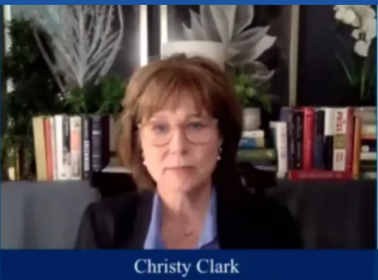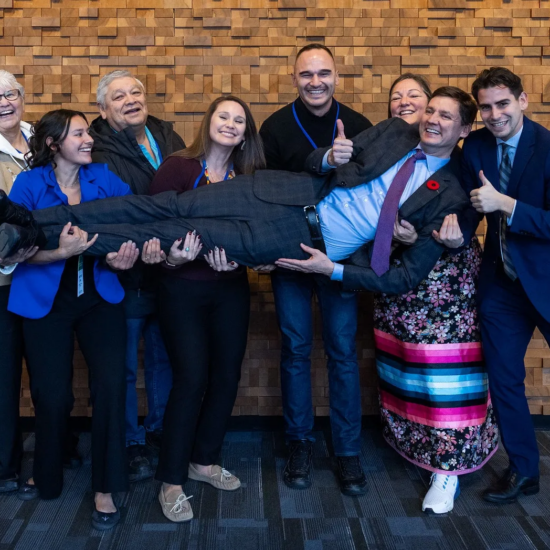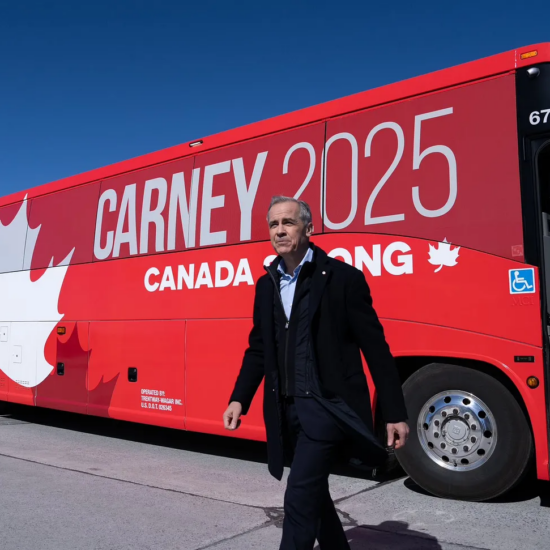
Bob Mackin
Former B.C. Premier Christy Clark claimed April 20 at the Cullen Commission on money laundering that the BC Liberal Party received big money donations from those it regulated, because they simply shared the party’s ideals.

Christy Clark testified April 20 at the Cullen Commission (Cullen Commission)
Commission counsel Patrick McGowan asked Clark whether she was aware that casino companies Great Canadian Gaming and Gateway Casinos had donated to her party. Elections BC’s database shows $220,304 from Gateway Casinos from 2015 to 2017 and $127,274 from Great Canadian Gaming during the same period.
Clark downplayed big money donations, like $100,000, as a small portion of a party’s $10 million campaign war chest.
“My view of the reason people gave money to my party, wherever they were from, was because we believe in a strong economy, we believed in lower taxes, a smaller government, more jobs for people,” said Clark, premier from 2011 to 2017.
McGowan asked whether she had a viewpoint on the governing party taking donations from those that it regulated. But Clark’s answer indicated she may be unaware that the NDP government prohibited donations from corporations and unions when it took over in 2017.
“Government, political parties take still to this day take donations from organizations and businesses across the province that we regulate, forestry companies donate to political parties, that’s a regulated business, mining as well, liquor companies also regulated,” Clark said. “I mean, you could go right across. Pharmaceutical companies, also regulated. There’s a lot, that exists right across government. It’s not unique to gaming by any stretch of the imagination.”
For much of her time on the virtual stand, Clark claimed she ran a hands-off approach, leaving it to cabinet ministers, deputy ministers and executives to run their own departments.
“I wasn’t involved in the day to day operations of ministries and Crown corporations, it’s not something a premier would be normally advised about. The premier is siting atop 20 ministries each of which have tons of really important issues and not everything can be reported or is reported back directly to the premier.”
She said her government was “profoundly concerned about public safety and controlling crime in B.C.,” but hers was not a government “always trying to just get more revenue.”
Evidence introduced earlier in the Cullen Commission showed that Clark’s cabinet was indeed exerting pressure on B.C. Lottery Corporation to increase its profitability.
Clark was evasive for a lengthy stretch. McGowan asked whether she was aware or even concerned that casino patrons arrived with shopping bags full of cash.
“If you’d been told that somebody was dropping off a shopping bag at midnight containing $200,000 in $20 bills and that was then being accepted by [a casino] … would you have intervened?” he asked.

Christy Clark testified April 20 at the Cullen Commission (Cullen Commission)
“I can’t answer questions about what might have happened, but I can say that we took significant action in the years that I was [in office],” Clark said.
Clark later said she felt “all crime needs to be addressed appropriately” and that her priority was battling guns and gangs.
She was also asked to recall any specific action taken to counter money laundering. She gave no example, but instead pointed to the 2016 formation of the Joint Illegal Gaming Investigation Team after cash transactions spiked in mid-2015 at River Rock Casino Resort in Richmond.
Clark also shrugged at evidence that money laundering contributed to skyrocketing real estate prices during her tenure. She said it was instead a function of B.C.’s attractive environment, low interest rates, a booming economy and high immigration rates from other Canadian provinces and other countries.
Clark testified under oath to Commissioner Austin Cullen via web conference. But, shortly after she swore she would tell the full truth, she was asked her full name and omitted her middle name (Joan) and failed to mention she spent four years as an executive for an immigrant investor fund’s international education subsidiary (RCI Pacific Gateway Education Inc.) and lobbied for other clients of her then-husband Mark Marissen’s Burrard Communications. McGowan did not notice either omission.
WATCH: At @CullenInquiryBC, @ChristyClarkBC swore she would tell the whole truth.
Then she was asked her full name.
She omitted her middle name.
Then was asked about her time out of office.
She mentioned only her @CKNW talkshow.
She omitted her career as a lobbyist.#bcpoli pic.twitter.com/WMWTRG99gQ— theBreaker.news (@theBreakerNews) April 20, 2021
Since quitting politics in 2017, Clark has become a senior advisor to the Bennett Jones law firm (she is not a lawyer), and a director on the boards of Shaw Communications, Constellation Brands and Recipe Unlimited, the parent company of The Keg and several other restaurant chains.
Former gambling ministers Mike de Jong (April 23) and Rich Coleman (April 28) are scheduled to testify.
The list of witnesses does not include Clark’s predecessor, Gordon Campbell, who reorganized B.C.’s gambling industry in 2004. Likewise, Patrick Kinsella is not on the docket.
Kinsella is a central figure in B.C. politics who masterminded Campbell and Clark’s rise to power and became one of the most-powerful lobbyists. His clients included Great Canadian Gaming.
Witness testimony is expected to end May 14. Cullen has until December to report to the NDP cabinet.
Support theBreaker.news for as low as $2 a month on Patreon. Find out how. Click here.











